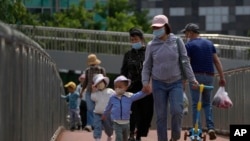Zhang Nanfeng works for a Japanese company in Beijing. Married 12 years, she and her husband don't want children.
"When others talk about the quarrels caused by raising children and the distress caused by tutoring children with homework, I feel very lucky that I don't have children," Zhang, 44, told VOA Mandarin.
The couple is focused on making money and enjoying themselves. They're planning to visit Japan sometime soon. "My husband and I are very happy that we can leave any time without too many worries," she said. "We enjoy this freedom!"
Zhang's lifestyle contrasts with what Chinese leader Xi Jinping has in mind for women as the country faces the economic consequences of a rapidly declining birth rate.
According to statistics from China's National Health Commission, China had 9.56 million live births in 2022, a 10% drop from 10.62 million in 2021, setting a record low and ushering in China's first decline in population growth in 61 years.
In 2022, about 6.8 million couples registered for marriage, half of the number in 2013 and the lowest level since official registries began in 1986.
Speaking at the 13th National Congress of Chinese Women on October 30, Xi said China must actively cultivate a new culture of marriage and childbearing.
He said it is also necessary to strengthen guidance on young people's views on marriage, childbirth and family; promote the improvement and implementation of fertility support policies; improve the quality of population development; and actively respond to the aging of the population, according to the official Xinhua News Agency.
Analysts say Xi talked about "preventing and resolving risks in the women's field," which they say means women's rights and gender issues have been officially defined by the CCP as a political risk that needs to be addressed. Beijing believes feminism is linked to foreign forces, so authorities must be on guard against it.
Lu Pin, a Chinese feminist activist living in the U.S. and working on her doctorate in women and politics at Rutgers University in New Jersey, told VOA Mandarin that in China, the family is considered a building block for national stability and that the government now sees women as the stabilizing center of each family.
Lu said it is almost impossible for feminists to engage in public advocacy, although a few have called for better treatment in online discussion platforms regarding marriage and childbirth.
One netizen commenting under the name of Lin posted, "Only by creating a more equal employment environment for women and ensuring women's independence can marriage and families in the social structure have a stable foundation."
Another netizen argued that to increase the fertility rate, compulsory parental leave must be introduced for men. “Otherwise, if the maternity leave is extended now, women will be forced to lose their jobs, let alone have children."
Lu said many women have responded to the constraints on feminism through a kind of passive resistance that has contributed to the demographic crisis. “They do not get married or have children, or at least they do not marry and have children according to the patriarchal expectations."
The apparent drive to push women into a role as homemakers is a stark departure from the Communist Party’s early principles.
Wu Weiting, director of the Institute of Gender Research at Taiwan Shih Hsin University, told VOA Mandarin that when the Communist Party of China was founded in 1921, it encouraged women to be independent as part of its revolt against the prevailing feudal ethics.
Founding Chairman Mao Zedong encouraged women to join the workforce, saying, "Whatever men comrades can accomplish, women comrades can too." He famously proclaimed, "Women hold up half the sky."
"However, the situation has changed a lot," said Wu.
In a reversal of its long-held one-child policy, the government in recent years began encouraging couples to have two and now three children. But authorities failed to help women balance child care and career development, Wu said. She said the party's push for multiple children drove women out of the workplace and the public sphere and back home.
Statistics support that perception. According to the 2022 Global Gender Gap Report released by the World Economic Forum last year, China ranked 120 out of 146 countries in women's political empowerment, slipping from 118th in 2021.
Wu sees the CCP's move to return women to more traditional roles as a continuation of its crackdown on gender rights defenders, especially on women's rights organizations, which began after Xi came to power in 2014 and began strengthening the party’s social control.
She said gender equality rights protection is now a censored phrase on the Chinese Internet.
She believes Xi wants the family traditions restored because he sees human rights of LGBTQ as a Western construct. Wu sees this year's prohibition on items with rainbow imagery, a symbol of gender diversity, as "a Chinese confrontation with the United States or the Western world."







